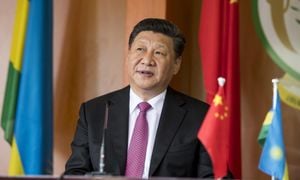President Joe Biden is making headlines as he travels to Peru and Brazil this week for the Asia-Pacific Economic Cooperation (APEC) summit and the G20 conference. This trip is particularly significant, as it may represent his last opportunity to shape global perceptions of U.S. foreign policy as he meets with leaders from some of the world’s largest economies. Notably, this trip occurs amid the backdrop of Donald Trump’s return to political prominence, raising questions about how Biden will adjust his message on America’s role on the world stage.
During his presidency, Biden has frequently proclaimed, "America is back," hoping to assure allies of the United States’ commitment to global partnership after Trump’s controversial foreign policy strategies. Trump often displayed skepticism toward international alliances like NATO, and his unconventional diplomatic methods shocked many world leaders. Now, with Trump back on the political scene, Biden faces the challenge of re-establishing U.S. leadership and assuring allies of its long-standing commitments.
Background suggests the stakes are high; Trump’s victory has reignited concerns among international observers who had hoped Biden would advance traditional diplomacy. According to Ben Rhodes, who served as deputy national security adviser under former President Obama, the world has grown accustomed to Trump’s worldview. Many nations are no longer viewing his presidency as merely aberrational but rather as part of a potential shift toward a U.S. foreign policy defined by transactional arrangements and less emphasis on multilateralism.
Trump's foreign policy approach didn’t just shift away from established norms but often imposed tariffs on allies and some adversaries alike, contributing to the unsettled dynamics of global trade relations. Biden must now clarify whether his administration’s previous commitments will endure under the looming threat of Trump’s return to power.
One major area of interest for Biden during this trip is China, the world’s second-largest economy. Biden’s approach to China has largely mirrored several strategies from the Trump administration, maintaining tariffs and focusing on strengthening partnerships with nations like India and Australia to counterbalance Chinese influence.
But this complicated dance around international diplomacy doesn’t stop there. The foreign policy actions taken by the Biden administration have often resulted from Trump's prior decisions, particularly concerning the Middle East. Now, as Trump re-emerges, the consequences of Biden’s strategies are coming to the forefront, as seen within the tumultuous climate of U.S.-Middle East relations.
Biden's Middle East policy has faced significant scrutiny. Some analysts argue he has assumed the role of previous presidents who grappled with complicated conflicts stemming from the region. Like Jimmy Carter and George W. Bush before him, Biden's strategies have been criticized for yielding limited success and for how they impinge on America's global stance. Unlike his predecessors, though, Biden's difficulties stem partly from actions taken by allies rather than adversaries, especially following Israel’s military actions against Palestinian civilians.
Many youth and minorities within the United States have expressed their dissatisfaction with the Biden administration's support for Israeli military aggression, particularly during the recent escalations of violence against Palestinians. This stance has cast doubt on Biden's appeal among diverse voter groups and created possible challenges for potential successors, such as Kamala Harris, to rally support for the next election.
Throughout his earlier presidency, Biden aimed to apply diplomatic tools to navigate the Middle Eastern quagmire. For example, he lifted Trump-era sanctions on the Houthis, allowing humanitarian aid to flow back to war-torn Yemen. His administration also maintained smaller troop levels to support operations against ISIS. Yet incidents such as Biden’s hands-off approach to Israel’s actions have left many questioning whether the U.S. can effectively navigate this complex and ever-evolving diplomatic territory.
Conversely, Biden’s administration has faced challenges with Iran, particularly surrounding the 2015 nuclear deal termed the Joint Comprehensive Plan of Action (JCPOA). Although Biden’s team initially showed willingness to restore the agreement, attempts to reopen negotiations faltered. The strategy became mired by Biden's insistence on keeping high-pressure sanctions on Iran until it returned to compliance with the nuclear deal.
Trump's withdrawal from the JCPOA had included implementing stringent sanctions, crippling the Iranian economy, and paradoxically prompting Iran to resume nuclear activities, leaving the U.S. caught between maintaining its hardline stance and seeking diplomatic engagement.
The Biden administration's lasting impact on U.S.-Iran relations has been marred by Trump’s imposition of sanctions, limiting Biden's ability to shift gears and make significant diplomatic moves. Public sentiments on both sides have been sullied, highlighting the damage done to Biden's efforts toward rebuilding shattered relations.
The complications of U.S. foreign policy get even more nuanced as Iran emerges closer to other global powers like China and Russia, deciding to strengthen their political alliances during tumultuous geopolitical circumstances. Notably, Iran's membership in the Shanghai Cooperation Organization and the prospective strategic agreements between Tehran and Beijing showcase the shift of Iranian interests away from the West.
Biden aimed to manage relationships with key Middle Eastern nations using Trump's framework, pursuing strategies like the Abraham Accords which sought to normalize Arab relations with Israel. This approach, though controversial, was viewed as beneficial for entertaining economic deals and strengthening U.S. influence. Yet critics argue these strategies have often been approached solely through the lens of arms deals rather than actual improvements for the Palestinian situation.
Efforts to draw nations like Saudi Arabia and Sudan closer to Israel have faced hurdles; Saudi Arabia’s population maintains significant support for Palestinian causes. With public opinion indicating major opposition toward normalization without clear pathways toward addressing Palestinian rights, Biden has failed to create durable progress.
The Biden administration, instead of bolstering democratic movements within nations like Sudan, has often resorted to backdoor agreements aiming to stabilize relations without adequately addressing humanitarian needs. This dual approach is contributing to the perception of American diplomacy as transactional and less idealistic than it had been previously.
The challenges don’t end with Iran or Palestine. The tense situation between the United Arab Emirates and Iran, as well as the humanitarian crises throughout the Middle East, are replicable reminders of how precarious diplomacy can be. The presence of various factions, each with distinct interests and pressures, complicates any peaceful resolution.
With Biden headed to major summits during this trip, the messaging around America’s commitment to international alliances and diplomatic solutions will be under strict scrutiny. His success or failure may come down to his ability to articulate the U.S.'s current and future roles among its global peers, especially as critics move swiftly to define the legacy of his governance against Trump’s populist and often confrontational style.
Indeed, the upcoming meetings may well dictate whether Biden can reshape the narrative of American leadership or risk being overshadowed by the revival of Trump's policies, which often seem poised to reinstate old tensions and reorient global alliances around adversarial diplomacy.



